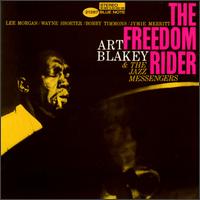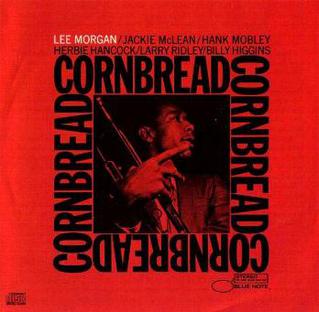Related Research Articles

Edward Lee Morgan was an American jazz trumpeter and composer.

Kai Chresten Winding was a Danish-born American trombonist and jazz composer. He is known for his collaborations with fellow trombonist J. J. Johnson. His version of "More", the theme from the movie Mondo Cane, reached in 1963 number 8 in the Billboard Hot 100 and remained his only entry here.

Blue Train is a studio album by John Coltrane which was released in January 1958 through Blue Note Records. It was recorded at the Van Gelder Studio in Hackensack, New Jersey. It is the only Blue Note recording by Coltrane as session leader, and has been certified a gold record by the RIAA.

"Ti Guarderò Nel Cuore", later released under the international title "More", is a pop song adapted from a film score written by Riz Ortolani and Nino Oliviero for the 1962 Italian documentary film Mondo Cane. Ortolani and Oliviero originally composed the melody as an orchestral arrangement that served as the film's theme music. Italian lyrics were provided by Marcello Ciorciolini, which were adapted into English by Norman Newell. It has since become a pop standard.

The Sidewinder is a 1964 album by the jazz trumpeter Lee Morgan, recorded at the Van Gelder Studio in Englewood Cliffs, New Jersey, U.S. It was released on the Blue Note label as BLP 4157 (mono) and BST 84157 (stereo).

Moanin' is a studio album by Art Blakey and the Jazz Messengers, released in January 1959 by Blue Note Records.

The Freedom Rider is an album by jazz drummer Art Blakey and his group the Jazz Messengers, recorded in 1961 and released in 1964 by Blue Note Records. Continuing Blakey's distinct brand of hard bop, this album features compositions from Wayne Shorter, Lee Morgan, Blakey himself, and Kenny Dorham, a former Jazz Messenger. This was the final album by this particular edition of the Jazz Messengers, who had been together for 18 months, as Lee Morgan left after this album and was replaced by Freddie Hubbard.
"The One I Love (Belongs to Somebody Else)" is a popular song composed by Isham Jones with lyrics by Gus Kahn. The song was recorded by Isham Jones' Orchestra on December 21, 1923, at Brunswick Studios in New York City, and published on January 7, 1924. On January 17 in Chicago, Jones recorded another version, with Al Jolson on lead vocals. Both versions made the charts that Spring, with Jolson's peaking at number 2, and Jones' at number 5. Sophie Tucker recorded her version February 1924, released on Okeh 40054.

Tom Cat is an album by Lee Morgan recorded in 1964, though only issued in 1980. It was originally released as LT 1058. While lesser known in comparison to The Sidewinder and other albums, it features several of Morgan's contemporary Blue Note recording artists, such as McCoy Tyner, Art Blakey, and Jackie McLean. After The Sidewinder's huge commercial success, Tom Cat and Search for the New Land from earlier in 1964 were both shelved. Instead, Alfred Lion, Blue Note's producer, encouraged Morgan to record a new funky theme and brought him back into the studio to record The Rumproller. Search for the New Land was released in 1966, but Tom Cat remained unreleased until 1980.

Introducing Wayne Shorter is the debut album by jazz saxophonist Wayne Shorter. It was recorded on November 9th and 10th, 1959, at Bell Sound Studios in New York City. It features five Shorter compositions, plus Kurt Weill's "Mack the Knife”, performed by a quintet featuring trumpeter Lee Morgan, pianist Wynton Kelly, bassist Paul Chambers and drummer Jimmy Cobb. Shorter played with Morgan in the front line of Art Blakey's Jazz Messengers at this time while Kelly, Chambers and Cobb were the widely celebrated rhythm section with Miles Davis.
"Johnny One Note" is a 1937 show tune from the 1937 Rodgers and Hart musical Babes in Arms, where it was introduced by Wynn Murray. Judy Garland sang it in the Rodgers & Hart biopic Words and Music (1948).

Cornbread is an album by American jazz trumpeter Lee Morgan. Recorded in September 1965 but released on the Blue Note label in early 1967, the album features performances by Morgan, along with sidemen Herbie Hancock, Billy Higgins, Jackie McLean, Hank Mobley, and Larry Ridley.

Search for the New Land is an album by jazz trumpeter Lee Morgan. A set with a group of regular Blue Note sidemen, Search for the New Land was recorded before The Sidewinder was released. Although it was recorded in 1964, the album was shelved for two years, then issued with the original catalogue number 84169.

Night Dreamer is the fourth album by American jazz saxophonist Wayne Shorter. It was released in November 1964 by Blue Note Records. With a quintet of trumpeter Lee Morgan, pianist McCoy Tyner, bassist Reggie Workman and drummer Elvin Jones performing six Shorter originals.

"Washington Square" is a popular instrumental from 1963 by the New York City-based jazz group The Village Stompers. The composition was written by Bobb Goldsteinn and David Shire.

Live at the Lighthouse is a live album by jazz trumpeter Lee Morgan, released on the Blue Note label in 1971. The album features a quintet of Morgan, Bennie Maupin, Harold Mabern, Jymie Merritt, and Mickey Roker, recorded at The Lighthouse in Hermosa Beach, California in July 1970. Originally released as a double LP comprising four side-long recordings, the 1996 CD reissue expanded the track list with over one-hundred minutes of additional material from the Lighthouse gigs. In 2021, Blue Note released an 8-CD/12-LP box set featuring the complete recordings of Morgan's three-night stint to commemorate the original album's fiftieth anniversary.

Jay and Kai + 6 is the fifth album by jazz trombonists J.J. Johnson and Kai Winding, credited on this album as The Jay and Kai Trombone Octet. The title refers to the six trombonists who accompany Johnson and Winding on the recording. Columbia Records released the album as a monaural LP record in 1956. In December 1956, Jay and Kai + 6 reached the № 3 position on the Billboard jazz chart.
Bossa Nova U.S.A. is a studio album released by the Dave Brubeck Quartet in 1963 by Columbia originally in the United States as LP record CS 8798 (stereo) and CL 1998 (mono) and in England as SBPG 62127. It was also released by CBS in Australia, as catalog SPB 233.038.

The Brothers is a studio compilation album by American saxophonists Stan Getz and Zoot Sims released in 1956 via Prestige label.

Dirty Dog is an album by jazz trombonist and arranger Kai Winding recorded in 1966 for the Verve label.
References
- ↑ Spellman, A. B. and Horwitz, Murray (August 1, 2001) "Lee Morgan: 'The Sidewinder'". npr.org. Retrieved October 20, 2013.
- ↑ Seymour, Gene (2005) in Kirchner, Bill (ed.) The Oxford Companion to Jazz, Oxford University Press, p. 388.
- 1 2 Feather, Leonard "The Sidewinder" [LP liner notes].
- 1 2 Cook, Richard (2004) Blue Note Records: The Biography, Justin, Charles & Co., p. 182.
- 1 2 3 McMillan, Jeffery S. (2008) DelightfuLee: The Life and Music of Lee Morgan. University of Michigan Press.
- ↑ Whitburn, Joel (2013). Joel Whitburn's Top Pop Singles, 14th Edition: 1955–2012. Record Research. p. 591.
- 1 2 3 Cook, Richard; Morton, Brian (2008). The Penguin Guide to Jazz Recordings (9th. ed.). New York: Penguin. p. 1039. ISBN 978-0-141-03401-0.
- 1 2 3 Perchard, Tom (2006) Lee Morgan: His Life, Music and Culture, Equinox, p. 159.
- ↑ "Kai Winding: Dirty Dog". AllMusic. Retrieved October 22, 2013.